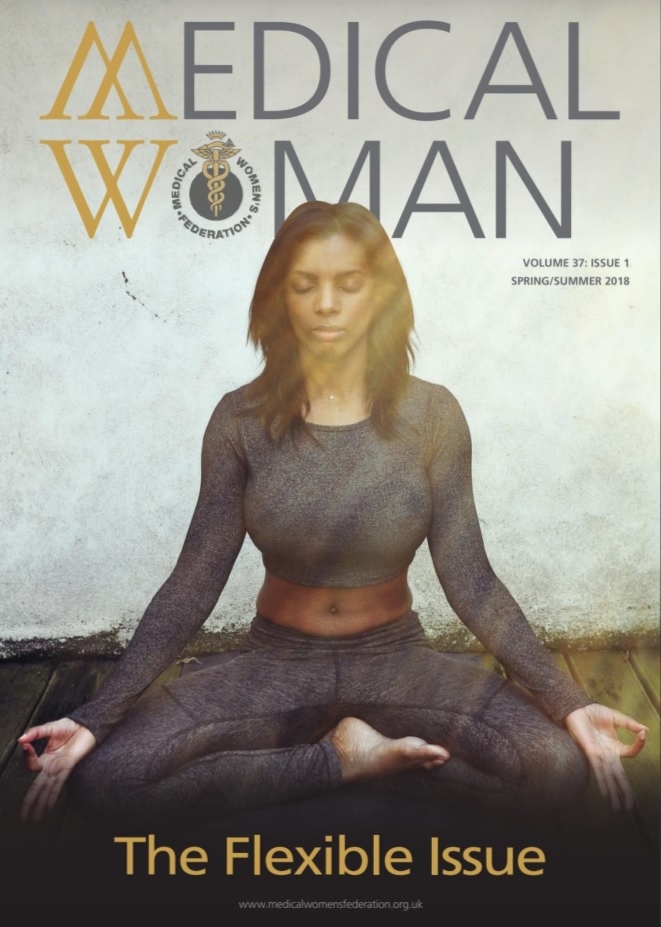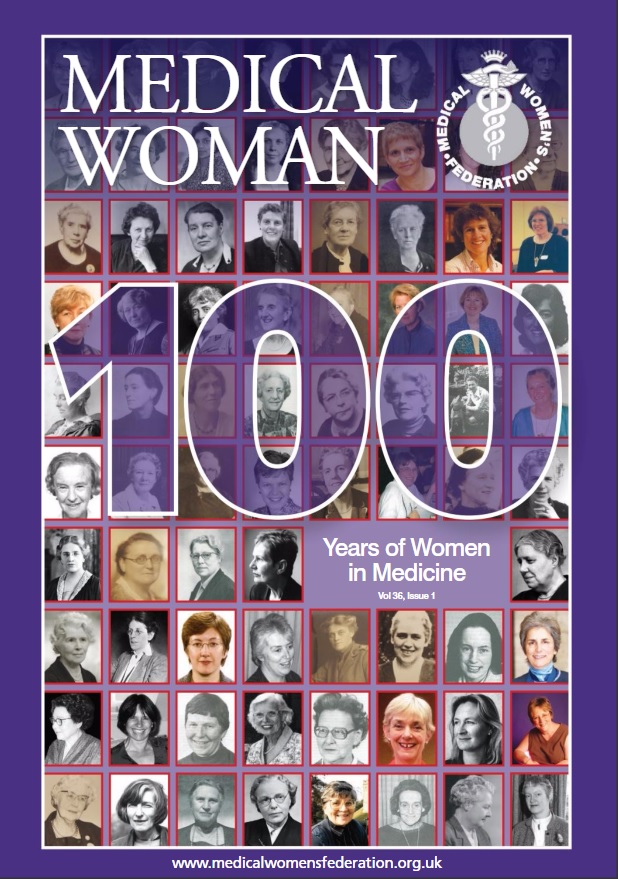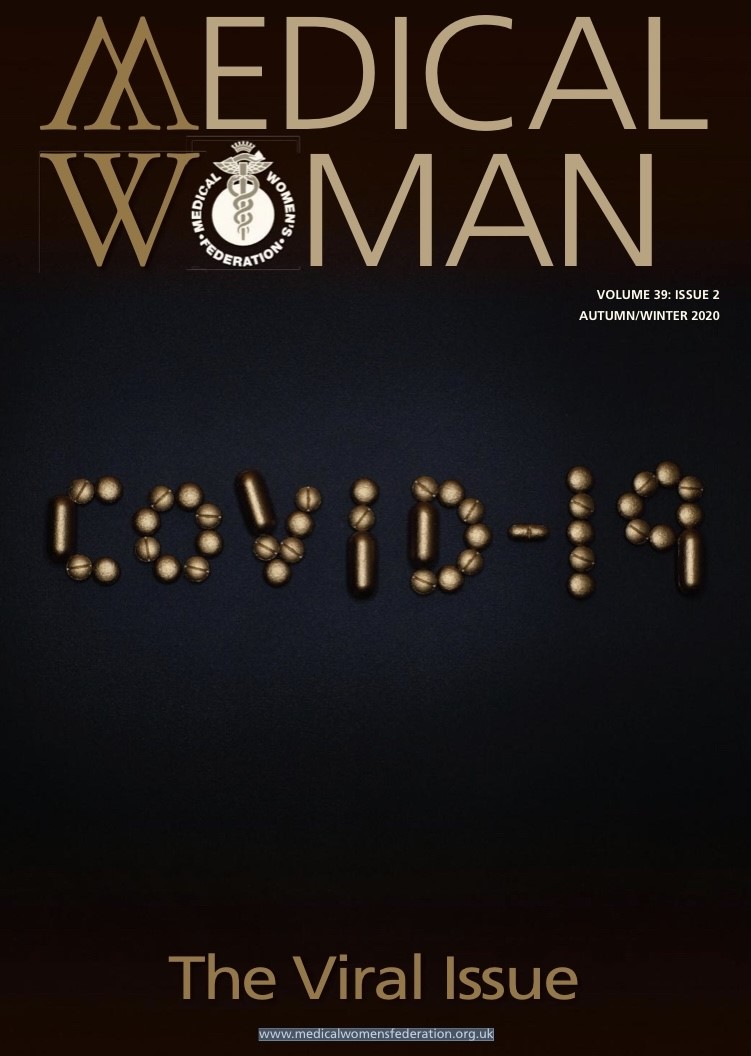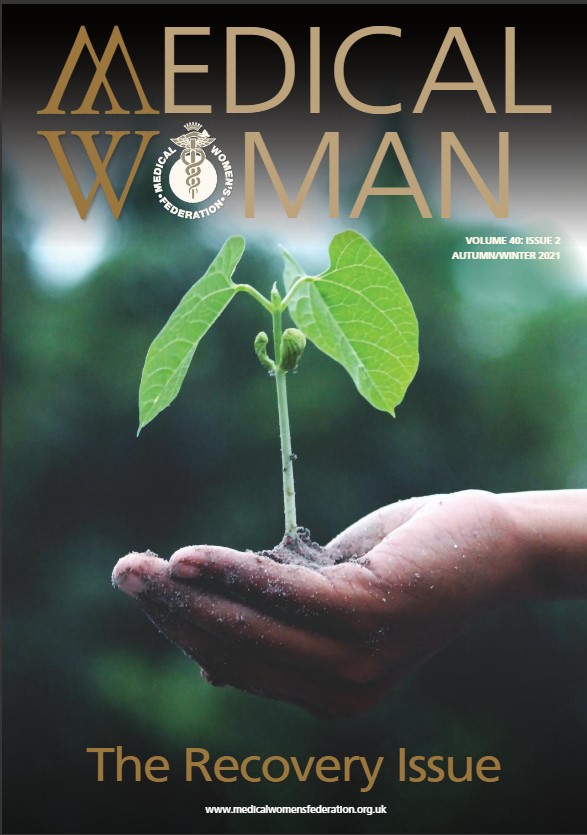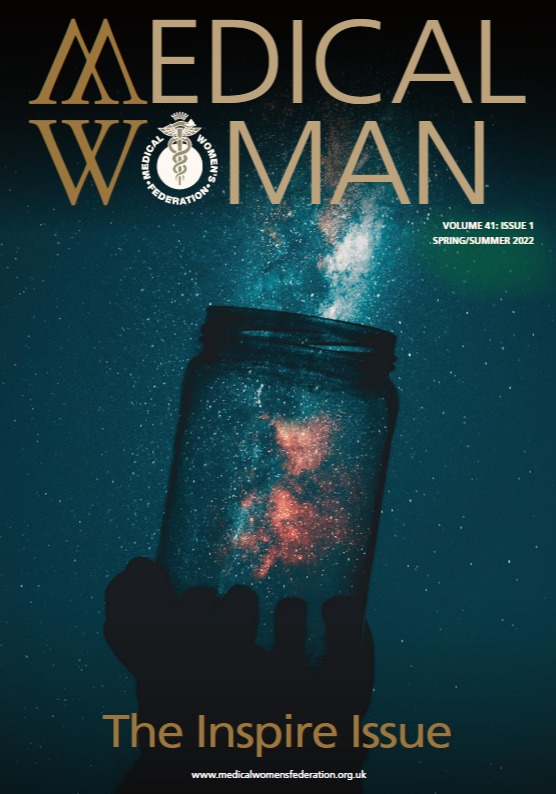Articles/publications by MWF Officers and Members. For all press enquiries please contact MWF Central Office.
Careers
Female doctors in menopause retiring early due to sexism, says study - The Guardian, Professor Neena Modi is quoted.
Publication: The Role Models who Sustain Medical Women's Career Engagement. Who Do They Need to Be, and What Do They Need to Do?
Are sabbaticals still an option for today's doctors? Kathy Oxtoby interviews Dr Sally Davies for BMJ Careers
Family friendly workplaces for doctors in training – BMJ Careers, Dr Beryl De Souza and Paul Deemer.
GPs air their views: Best opinion and debates from 2013 - Pulse, Dr Fiona Cornish and Dr Sara Khan take the top two most read articles respectively.
Do the classic specialty stereotypes still hold true for today's doctors? – BMJ Careers, Kathy Oxby asks our members.
Publication: Career Breaks for NHS and University doctors: An analysis of the WAM database
This report highlights the issues raised by doctors in the survey and therefore identifies those factors that can support and deter doctors in returning from career breaks.
Press Release: Patients' and Doctors' Safety: Can women change the culture of the NHS?
BBC Radio 4 Women's Hour: 'Part-Time GP's' As more women than men train as GPs what affect will that have on patients and the NHS? Dr Fiona Cornish and Anna Soubry MP discuss.
The Big Interview with Dr Fiona Cornish
'We need to create an environment where there is more opportunity for women to become leaders in general practice' an interview with Dr Fiona Cornish, filmed by PULSE. Watch the video here.
Letter of the week: Where were the women in Pulse's top 50 influential GPs? Pulse magazine, MWF President Dr Fiona Cornish, MWF Hon. Sec. Dr Beryl De Souza and Medical Woman Editor Dr Sara Khan. Click here to read the letter.
Women in Medicine in the Press May 2010
There were several articles in the press in May 2010 about the number of women entering medicine. MWF President Dr Clarissa Fabre put forward the case for MWF as did Leigh Regan, MWF's Student Representative at Peninsula Medical School. Articles appeared in the Daily Mail, Sunday Times and Dr Fabre also participated in an interview on Women's Hour, as did MWF members Prof. Jane Dacre and Miss Helen Fernandes.
- Daily Mail Article 4th May 2010
- The Sunday Times Article 9th May 2010
- Response to the Sunday Times Article 16th May 2010
- Interview on Women's Hour – from 9 mins 45
MWF Response to the EWTD
MWF acknowledges the EWTD has shortened training time. There is need for more evidence to show if there is compromise in patient safety and training if the EWTD reducing working hours to 48 hrs per week is instigated (1,2). We would like to ensure that Deaneries support the Royal Colleges and provide training for the trainers and for the trusts to ensure that both the trainees and trainers have adequate time for training to take place. It is without doubt that service will have been affected as long on call shifts are no longer possible. How much of this was training needs proper evaluation. Considering our flexible training members, there will have been only a small reduction in their hours due to EWTD and its introduction may enable some to work at higher percentages. Training is now competency based rather than time based. Our primary concern is that the Royal College of Surgeons statements (1,2) regarding surgical specialty opt out of the EWTD should not in any way deter our female medical students and junior doctors from pursuing a career in surgery.
References1. BOTA position statement on the European Working Time Directive and training in trauma and orthpaedic surgery – British Orthopaedic Trainees Association . January 2008. 2. The impact of EWTD on delivery of surgical services: A Consensus statement. Association of Surgeons of Great Britain and Ireland. November 2008.
MWF News
BBC Woman's Hour Celebrates 100 Years of the MWF
2017 marked the centenary of the Medical Women's Federation. To celebrate, BBC Woman's Hour spoke to leading female clinicians about the women from medical history who inspired them. Professor Dame Parveen Kumar discussed the work of Dr Jane Walker, who dedicated her life to helping Tuberculosis patients with open air sanatoriums and founded the MWF in 2017. The important question of why women doctors still need support to fully achieve equality is discussed, along with the lasting relevance of the Medical Women's Federation in 2017 and beyond.
Publication: Making Part-Time Work
The MWF, funded by the Women and Equality Unit, has been researching ways to facilitate part-time working in the medical profession. The research consisted of interviews and focus groups with part-time doctors of all grades and specialties throughout the UK as well as representatives from the Royal Colleges, Deaneries and HR. Our summary document was published on the 19th June 2008 and the full report can be found by clicking here.
BMJ Careers - The Medical Women's Federation Celebrates its long history
To commemorate MWF's 90th birthday, Honorary Secretaries Dr De Souza and Dr Ramsay wrote an article published in BMJ Careers on why it is still relevant today.
Gender Pay Gap
Press Release 15/12/2020 - Medical Women’s Federation response to the gender pay gap report
The Medical Women’s Federation welcomes the long-awaited release of “Mend the Gap” and the commitment from the Secretary of State “to tackle the gender pay gap”. The report confirms that on average, across general practitioners, academics and hospital doctors, the pay of women doctors is between 12% and 19% less than men having accounted for any differences in hours worked.
Jeremy Hunt, then Secretary of State for Health, commissioned the Gender Pay Gap report following the junior doctor contract negotiations in 2016, noting, “The new NHS contract for Doctors and Dentists in Training has a potentially negative impact on the pay gap due to a loss of increments during maternity leave”.
The Medical Women’s Federation, as a member of the review steering group, did not formally agree recommendations, but welcomes actions that will reduce the gender pay gap. The Federation also looks forward to details of implementation plans, responsibility for driving and monitoring change, and the timescale. In particular, the Federation would like to see opportunities to train flexibly and access parental leave promoted for both men and women, and an end to the discrimination in respect of ACCEA awards that has previously existed for those who work less than full time.
Professor Neena Modi, president of the Medical Women’s Federation said, “Women make up almost half of all NHS doctors yet they remain the victims of pay discrimination that emerges in large part, from a perpetuation of the premise that family and childcare are primarily their responsibilities, rather than shared with men. This is shocking, as gender-based assumptions have no place in a 21st century workforce.”
Professor Chloe Orkin, vice-president of the Medical Women’s Federation said, “Only when the deleterious effects of the gender pay gap on society, including the economy, become of equal concern to men and women, will we achieve gender parity. “
Press Release 29/03/2019 – Gender Pay Gap Review in Medicine
The MWF welcomed the interim findings of the Gender Pay Gap in Medicine Review published by the Department of Health and Social Care, which the MWF is contributing to as a key stakeholder. The interim findings confirm that male doctors in the NHS earn 17% more, on average, than their female peers.
Press Release 28/05/2018 – Gender Pay Gap Review in Medicine
The MWF welcomed Jeremy Hunt's announcement of an independent review, chaired by Professor Jane Dacre, on how to reduce and eliminate the gender pay gap in the medical profession.
70 years after the NHS’ foundation there persists a 15% gender pay gap among doctors. Women have always played a central role in the medical profession and over half of medical graduates in recent years are female. It is vital for existing and future generations of doctors that hardworking NHS staff are rewarded fairly and equally for their work, regardless of gender.
In 2006 data published by the BMA and Medical Women’s Federation indicated there was a 13% gender pay gap for consultants. Recent figures obtained by the BBC from health trusts, the Government and NHS Digital showed that just five out of the 100 top-earning NHS consultants in England are female, despite women making up a third of the total workforce. The figures highlight that, despite recent progress on gender pay, there is still a long way to go to close the pay gap.
Dr Henrietta Bowden-Jones, MWF President, said:
The Medical Women’s Federation (MWF) welcomes the Secretary of State for Health and Social Care’s announcement of an independent review on how to reduce and eliminate the current gender pay gap of 15% in the medical profession. The aims of the review are to identify the causes of this gender pay gap taking a whole career approach and, from that evidence, develop a series of relevant and implementable recommendations. We look forward to contributing to this important national work."
The MWF will work alongside other key stakeholders to support the development of relevant and implementable recommendations. The MWF maintains a commitment to supporting women doctors in reaching their full potential by providing networking, leadership and mentoring opportunities, as well as campaigning for quality flexible working opportunities in the profession.
MWF responds to BBC gender pay gap figures, February 2018. Responding to figures published by the BBC which shows a gender pay gap among consultants, Dr Sally Davies, MWF Past-President, said:
"We need to do more to support women. They often fall behind when they have children and have to take time off.
"By the time they get to the point where overtime is available or the awards are being handed out they find themselves behind men. It's a serious problem."
Publication: Gender Pay Gap report
Is there equal pay in healthcare? Not if you are a doctor.
Read Past MWF Honorary Secretary Dr Beryl De Souza's response to John Appleby's editorial in the BMJ here.
BBC Radio Wales 'The Gender Pay Gap' - Dr Amanda Owen
Dr Amanda Owen, previous editor of Medical Woman contributed to a Radio Phone-In on BBC Radio Wales on the topic 'Why do women get paid 17% less than men?'. Also appearing on the programme was Dr Katerine Rake, director of Fawcett Society and speaker at MWF's Autumn Meeting 2008.
Campaigning
A coalition of medical leaders call for swift action to remove GMC’s power to appeal tribunal decisions, April 2021.
Read the GP Online Article here
MWF responded to an article in the Guardian re IPSA MPs Parental Leave, June 2019
The Medical Women’s Federation feels it is time for the Independent Parliamentary Standards Authority to recognise parental leave for MPs (Editorial, 19 June). If civil servants on maternity leave are entitled to 26 weeks’ full pay then it would seem only right and fair to offer a similar deal to MPs. The wellbeing of new mothers will impact on the stability of the couple and in turn will ensure a safe and harmonious environment for the new child.
Dr Henrietta Bowden-Jones, Prof Neena Modi and Prof Chloe Orkin
BBC Radio 4 - Moral Maze: Reforming Abortion Law Provocative and engaging debate on reforming abortion law, chaired by Michael Buerk with Prof Wendy Savage as first witness.
"Why are there so few female specialists in the media, and how can this be changed?" Dr Beryl De Souza & Tami Hoffman on the BMJ Careers Site.
Should all advertising of cosmetic surgery be banned? Yes MJ Rapid Response, Dr Fiona Cornish and Dr Beryl De Souza
Is there equal pay in healthcare? Not if you are a doctor.
Read Past MWF Honorary Secretary Dr Beryl De Souza's response to John Appleby's editorial in the BMJ here.
Not Taking Over Just Catching Up
MWF Past President Dr Clarissa Fabre was interviewed by MDDUS's publication about the role of women in general practice.
THE FEMALE FACTOR - The Changing Face of Medical Care
MWF features heavily in this article that appeared in the New York Times and the International Herald Tribune. Members featuring include Dr Fiona Cornish and Dr Beryl De Souza. Click here to read.
MWF Press Releases
Press Release 06/04/2021 -UK healthcare leaders unite in call for GMC to be finally stripped of power to appeal fitness to practice decisions
A coalition of 13 leading healthcare organisations have urged the Government to deliver on its 2018 commitment to strip the General Medical Council (GMC) of its power to appeal decisions made by the Medical Practitioners Tribunal Service (MPTS).
In 2018 the Government accepted in full the recommendations of the Williams review into gross negligence manslaughter in healthcare, following the case of Dr Hadiza Bawa-Garba - this included the central recommendation that the GMC should have its right to appeal fitness to practise decisions removed.
The relevant legislative changes have however not been made to the Medical Act, so the GMC continue to appeal decisions. According to data obtained through an FOI request, since the start of 2018 it has challenged at least 14 MPTS decisions.
The Williams review concluded that removing the GMC’s right of appeal against MPTS decisions would help to address the mistrust of the GMC amongst doctors and contribute to cultivating a culture of openness that is central to delivering improved patient safety. It also said that public protection would still be maintained, with the Professional Standards Authority (PSA) retaining its near identical right of appeal to MPTS decisions.
The letter to the Health Secretary calling for section 40A of the Medical Act 1983 to be finally removed as part of the forthcoming Health and Social Care Bill, was signed by Medical Protection Society, The Doctors’ Association UK, Hospital Consultants and Specialists Association, British Medical Association, Royal College of General Practitioners, Royal College of Surgeons of England, Royal College of Physicians, Royal College of Paediatrics and Child Health, Royal College of Surgeons of Edinburgh, Medical Women’s Federation, Association of Anaesthetists, British Association of Physicians of Indian Origin, and Medical Defence Shield.
Professor Dame Jane Dacre, President at the Medical Protection Society who coordinated the letter, commented:
“The strength of feeling on this issue from right across the healthcare community is clear to see. The GMC’s power to appeal decisions made by the MPTS has led to fear across the medical profession and a lack of confidence in the GMC. It is also unnecessary as the PSA has the authority to appeal decisions. The GMC is the only UK health regulator that has such a right of appeal.
“The Government agreed that the GMC should be stripped of the power in June 2018, following the Professor Sir Norman Williams review into Gross Negligence Manslaughter in healthcare. However, until the relevant legislative changes are made to the Medical Act, the GMC can and do continue to challenge decisions.
“The Government’s recommitment to removing the GMC’s right to appeal within the recent consultation on broader professional regulation reforms is welcome. It is however almost three years since it committed to making this change, and it should not be held up while a wide range of other complex proposals go through a round of further consultation.
“Implementing this change as part of the forthcoming Health and Social Care Bill would give the profession confidence that their concerns and the recommendations of the Williams review are now being acted on.
“There has never been a more important time to address this shortcoming. Covid-19 has sparked discussion about the extent to which individuals should be held to account when working in pressurised and extreme circumstances, and now more than ever, the regulator needs to be able to operate in a way that instils confidence amongst patients and doctors.”
Press Release 04/07/2020 - NHS 72nd Birthday Statement
Medical Women’s Federation NHS 72nd Birthday Statement
On July 5, the 72nd anniversary of the NHS, across the UK, people will clap for the NHS, as they did during lockdown. They clap in gratitude for freedom from fear because the NHS is here for all of us, and for public sector healthcare workers motivated by professional values, duty and compassion, not the incentives of the market. We celebrate the professionalism of healthcare workers. However, we must highlight that the NHS we cherish is in grave danger.
The NHS has moved progressively towards marketisation. Behind the familiar logo now lies a fragmented patchwork of varied providers, a growing number of which are for-profit, and divert monies away from front-line services. The profits of these non-NHS providers are unknown but likely to be substantial. Department of Health figures for England show around £9.2 billion (7.3% of the NHS budget) was spent on independent sector providers over 2018/19.
In any marketised system, women, children and the disadvantaged suffer most. Health inequalities are unfair and avoidable yet they are widening. COVID-19 has disproportionately affected black, Asian and minority ethnic communities. Young female NHS workers have a COVID-19 mortality rate almost double that of non-NHS counterparts. Childhood vaccination rates are falling. Abortions are at a highest level, a tragic consequence of the 20% cuts to contraceptive funding in the last five years, with three-quarters undertaken, and paid for, in the non-NHS sector.
When COVID-19 struck, NHS bed numbers were inadequate, supply chains erratic and staffing shortages at about 100,000. Hence, the scrabble to build Nightingale hospitals and recall retired staff. We saw shortages of ventilators and PPE, and despaired at testing and contact tracing undertaken by private sector companies with unproven experience. Over 60,000 people have died in the UK from COVID-19 thus far, yet there seems to be a move to embed private firms further into the NHS supply chain. Government has included medicines in post-Brexit UK-USA trade negotiations, and given no assurances they will exclude NHS services.
We condemn the superficiality of political thinking that wishes to commodify UK healthcare. This will further widen already growing inequities and increase costs. As we celebrate our NHS, we ask the public to demand its restoration as a publicly funded, primarily publicly provided service, integrated across acute, social and preventive care sectors, in keeping with its magnificent founding principles.
Professor Neena Modi, president of the Medical Women’s Federation said, “We are issuing this statement because the UK public has a right to know the twin perils faced by the NHS. First, the growing number of poorly integrated non-public providers of public services, and second, progressive destabilisation by an enlarging parallel private healthcare sector that poaches staff, but contributes little to training, preventive health, or the care of patients with complex, long-term conditions. There is ample evidence that the marketisation of healthcare increases costs, diminishes the ethical basis of medicine, and widens inequalities, with women, children and the disadvantaged suffering most.”
Professor Chloe Orkin, vice president of the Medical Women’s Federation said, “At this unprecedented moment when the NHS stands at a crossroads we call for a real commitment to safeguarding the hyper diverse NHS workforce, and securing the future of the NHS as a publicly delivered, publicly funded service for all.”
Press Release 29/03/2019 – Gender Pay Gap Review in Medicine
The MWF welcomed the interim findings of the Gender Pay Gap in Medicine Review published by the Department of Health and Social Care, which the MWF is contributing to as a key stakeholder. The interim findings confirm that male doctors in the NHS earn 17% more, on average, than their female peers.
Press Release 28/05/2018 – Gender Pay Gap Review in Medicine
The MWF welcomed Jeremy Hunt's announcement of an independent review, chaired by Professor Jane Dacre, on how to reduce and eliminate the gender pay gap in the medical profession.
70 years after the NHS’ foundation there persists a 15% gender pay gap among doctors. Women have always played a central role in the medical profession and over half of medical graduates in recent years are female. It is vital for existing and future generations of doctors that hardworking NHS staff are rewarded fairly and equally for their work, regardless of gender.
In 2006 data published by the BMA and Medical Women’s Federation indicated there was a 13% gender pay gap for consultants. Recent figures obtained by the BBC from health trusts, the Government and NHS Digital showed that just five out of the 100 top-earning NHS consultants in England are female, despite women making up a third of the total workforce. The figures highlight that, despite recent progress on gender pay, there is still a long way to go to close the pay gap.
Dr Henrietta Bowden-Jones, MWF President, said:
The Medical Women’s Federation (MWF) welcomes the Secretary of State for Health and Social Care’s announcement of an independent review on how to reduce and eliminate the current gender pay gap of 15% in the medical profession. The aims of the review are to identify the causes of this gender pay gap taking a whole career approach and, from that evidence, develop a series of relevant and implementable recommendations. We look forward to contributing to this important national work."
The MWF will work alongside other key stakeholders to support the development of relevant and implementable recommendations. The MWF maintains a commitment to supporting women doctors in reaching their full potential by providing networking, leadership and mentoring opportunities, as well as campaigning for quality flexible working opportunities in the profession.
Press Release: ACCEA Clinical Excellence Awards 2019
MWF, as a national nominating body, is delighted that ACCEA are proceeding with the 2019 clinical excellence awards round at national and local level. MWF will be encouraging women consultants and academics to consider applying for such awards in recognition of their achievements in the work that is carried out in their respective departments.
Press Release: Medical Woman: the magazine for female doctors 22/05/2013
Press Release: The Department of Health Review of Regulations on Cosmetic Interventions 24/04/2013
Press Release: KEEP YOUR MITTS OFF OUR MUFFS!
Press Release: Health and Social Care Act Press Release from President Clarissa Fabre, February 2012
The Health and Social Care Bill in England, even as amended so far in the House of Lords, will set the NHS up as a market and will lead to fragmentation of services rather than collaboration. Women form the majority of NHS employees. They are also higher users of the NHS because of their longevity and childbearing capacity. It has been suggested that many services may well become chargeable, for example antenatal and postnatal care and sexual health services which include contraception.
Women are therefore particularly likely to suffer if this bill is enacted. For these reasons the Medical Women's Federation calls on the government to withdraw the bill and genuinely work with the medical, nursing, midwifery and allied health professions to make the changes needed to cope with the increase in the number of elderly people, medical advances and austerity. The bill does not address any of these issues and rather than reduce bureaucracy it seems set to increase it with consequent unaffordable costs.
View older releases in our Press Release Archive


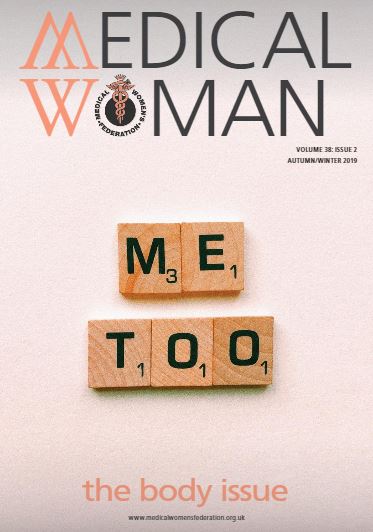
.jpg)

